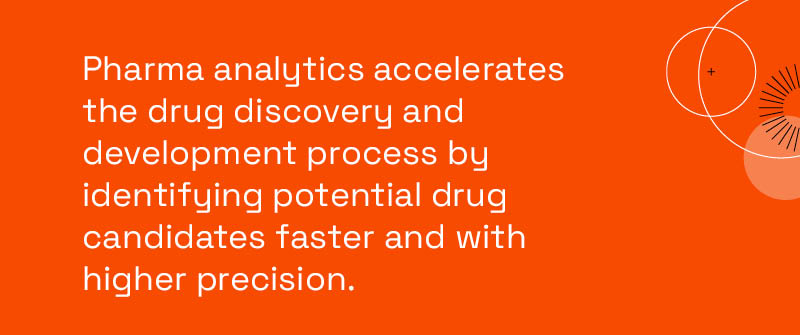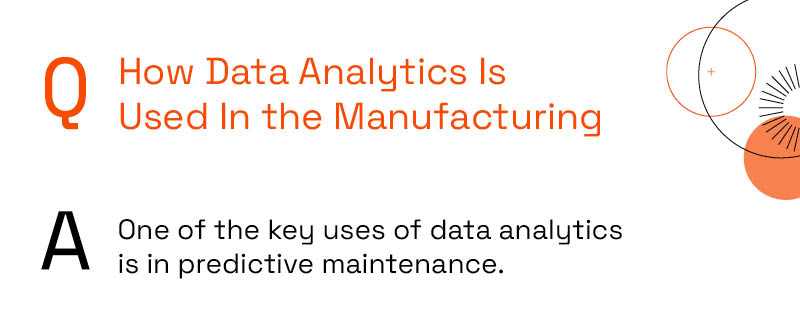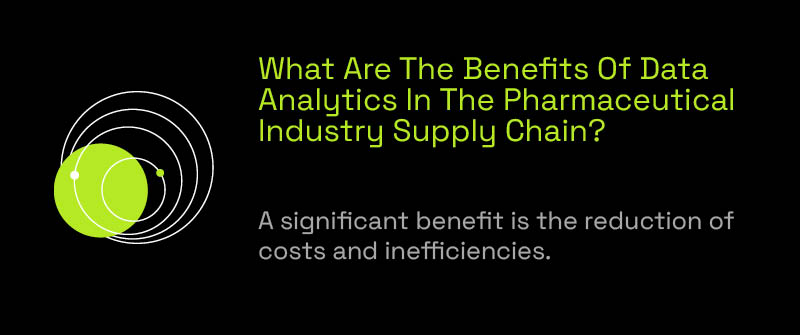
How Is Data Analytics Used In The Pharmaceutical Industry?
In today’s rapidly evolving pharmaceutical industry, manufacturing data analytics plays a crucial role that goes beyond mere data collection. It is the backbone of significant advancements and innovations, driving growth and providing a competitive edge. By leveraging data analytics, industry leaders can access real-time insights that enable strategic decision-making at every stage of the pharmaceutical lifecycle. Let’s explore three key areas where data analytics is reshaping the pharmaceutical landscape:
Enhancing Drug Discovery and Development
Pharma analytics accelerates the drug discovery and development process by identifying potential drug candidates faster and with higher precision. By analyzing vast datasets of biological, chemical, and clinical trial information, companies can predict the success of drug compounds and streamline research efforts. This not only reduces time-to-market but also cuts costs significantly, making drugs more accessible to patients.

Optimizing Clinical Trials
Clinical trials are notoriously complex and expensive. However, with data analytics in pharmaceutical manufacturing, companies can optimize trial designs, revamp the drug development process, recruit suitable candidates more effectively, and monitor patient outcomes in real-time. Analytics helps in identifying patterns and predicting potential adverse events, thus ensuring better safety and efficacy of drugs under investigation. This optimization is crucial for adherence to regulatory standards and improving the overall success rates of trials.
Improving Patient Outcomes and Personalized Medicine
Lastly, a significant application of data analytics in the pharmaceutical industry is in improving patient outcomes through personalized medicine. By analyzing types of data in the pharmaceutical industry, such as genetic information, lifestyle factors, and treatment histories, pharma companies can develop tailored therapeutic solutions. This personalization of treatment plans leads to better patient adherence and improved health outcomes, further establishing the company’s commitment to patient-centric healthcare.
How Data Analytics Is Used In the Manufacturing Industry?
Currently, data analytics use cases in manufacturing is not just an advantage—it’s a necessity. Pharma analytics encapsulates the transformative power of data to drive significant advancements in manufacturing processes, ensuring that companies stay ahead in the competitive market. Let’s delve into how data analytics is reshaping the manufacturing industry.

Predictive Maintenance of Manufacturing Equipment
One of the key uses of data analytics is in predictive maintenance and predictive analytics. By analyzing data from various sensors and machine logs, manufacturers can predict when equipment is likely to fail and schedule maintenance before a breakdown occurs. This proactive approach minimizes downtime, enhances operational efficiency, and extends the lifespan of machinery. In the pharmaceutical industry, where equipment reliability directly impacts product quality and consistency, predictive maintenance is crucial.
Data Analytics Ensures Product Quality and Compliance
Data analytics plays an essential role in developing and implementing a set of techniques or analytics applications to transform raw data into meaningful information. They ensuring high product quality and strict regulatory compliance with in the pharma industry. Through real-time monitoring and analysis, manufacturers can swiftly detect deviations in the production process that could compromise product integrity. Analytics tools can flag anomalies and recommend immediate corrective action, thus maintaining the stringent standards demanded in pharmaceutical manufacturing. Furthermore, comprehensive data records facilitate the compliance audit processes by regulatory bodies, like the FDA, ensuring that products meet all required standards.
Streamlining Manufacturing Processes
Analytics-driven insights facilitate the streamlining of various manufacturing processes. By analyzing production data, companies can identify bottlenecks, reduce waste, and optimize resource utilization. Advanced analytics and machine learning can forecast production needs, manage inventory levels more precisely, and optimize the supply chain. These enhancements not only improve productivity but also result in significant cost savings and better allocation of resources. For pharma analytics companies, leveraging these insights can transform operational efficiency and drive sustainable growth.
What Is The Role Of A Data Analyst In A Pharma Company?
Exploring the Crucial Role of a Data Analyst in a Pharma Company
In today’s data-driven landscape, the role of a data analyst in a pharmaceutical company is pivotal for driving innovation and ensuring operational efficiency. A Pharma Data Analyst plays a multifaceted role with tasks that range from data extraction to facilitating strategic decision-making. Let’s delve into these responsibilities to understand their impact on the industry.
Extracting and Cleaning Data
The foundation of any analytical work is robust and reliable data. A Pharma Data Analyst is responsible for extracting raw data from various sources, such as clinical trials, production logs, and marketing reports. Equally critical is the task of cleaning this data to ensure its accuracy and integrity. By eliminating errors and inconsistencies, analysts pave the way for meaningful insights, thereby laying the groundwork for innovative solutions and effective strategies.

Conducting Sophisticated Data Analysis
Once the data is prepared, the next step involves performing complex analyses to uncover trends, correlations, and patterns. This highly technical part of the job requires proficiency in various tools and techniques, often covered in specialized Pharma data analytics courses. The analysis may include statistical modeling, predictive analytics, and machine learning algorithms to provide actionable insights. The outcomes of these analyses can dramatically influence everything from drug development timelines to market entry strategies.
Communicating Insights to Stakeholders
Generating insights is only as valuable as the ability to communicate them effectively. A significant part of a Pharmaceutical Data Analyst’s role involves converting complex data sets into easily understandable reports and visualizations. These insights must then be communicated to key stakeholders, including researchers, executives, and marketing teams. Effective communication ensures that data-driven decisions are made with a clear understanding of the analytical findings.
Facilitating Data-Driven Decision Making
Data-driven decision making is at the heart of modern pharmaceutical strategies. A Pharma Data Analyst acts as a catalyst for this by providing actionable insights that can be leveraged for strategic advantages. From streamlining clinical trials to enhancing patient personalization, the data analyst ensures that decisions are backed by quantitative evidence. This level of analytical rigor not only optimizes current operations but also sets a precedent for continuous improvement and innovation.
What Are The Major Benefits Of Data Analytics In The Pharmaceutical Industry Supply Chain?
Enhancing Supply Chain Visibility
Data analytics provides pharmaceutical companies with unparalleled visibility into their supply chain. By leveraging advanced data analytics tools, companies can track and monitor the flow of raw materials and finished products in real time. This visibility allows for quicker identification of potential disruptions, enabling swift corrective actions. Enhanced supply chain visibility also assists in maintaining optimal inventory levels, reducing the risk of stockouts or overstock situations. The use of data analytics means that pharmaceutical companies can efficiently manage their logistics, leading to smoother operations and higher customer satisfaction.
Reducing Costs and Inefficiencies
Another significant benefit of data analytics in the pharmaceutical industry supply chain is the reduction of costs and inefficiencies. By analyzing historical and real-time data, companies can identify patterns that lead to waste and inefficiencies. With this information, they can implement more effective strategies to streamline operations, reduce waste, and lower operational costs. Data-driven insights help in optimizing routes, consolidating shipments, and improving overall resource utilization.

What is Demand Forcasting?
Accurate demand forecasting is essential for maintaining a balanced supply chain in the pharmaceutical industry. Data analytics plays a crucial role in this by utilizing historical sales data, market trends, and other relevant factors to provide reliable demand forecasts. These insights enable pharmaceutical companies to better anticipate market needs and adjust their production schedules accordingly. Accurate forecasting minimizes the risk of surplus inventory and reduces the chances of product shortages, ensuring that patients and healthcare providers always have access to necessary medications.
Ensuring Timely Delivery of Products
Ensuring that products reach their destination on time is critical in the pharmaceutical industry. Data analytics helps optimize delivery schedules by analyzing transportation data, weather conditions, and other factors that can affect delivery times. This strategic planning ensures timely and reliable delivery of products, which is especially important for life-saving medications and treatments that depend on punctuality.
Unlock the potential of your analytics program with P3 Adaptive. Our tailored solutions and expert consultants will transform your biggest data challenges into actionable insights. Empower your operations with the precision and efficiency required for executive excellence. Make informed decisions with confidence and optimize every step of your supply chain.
Get in touch with a P3 team member